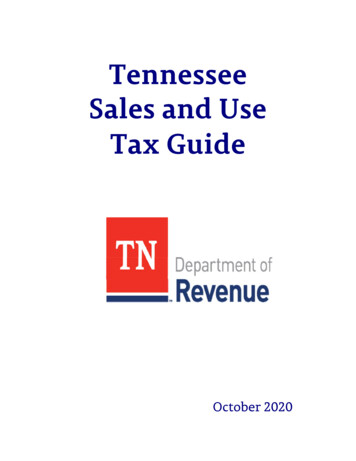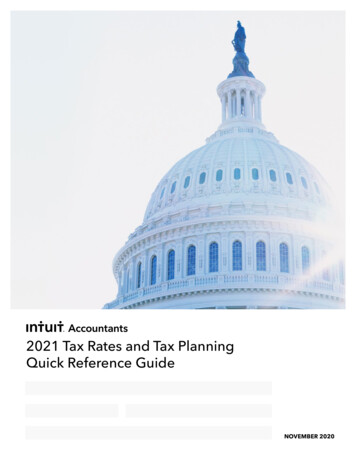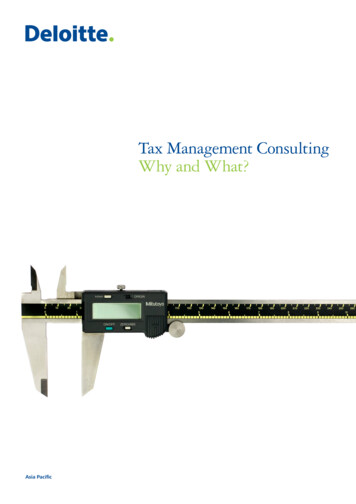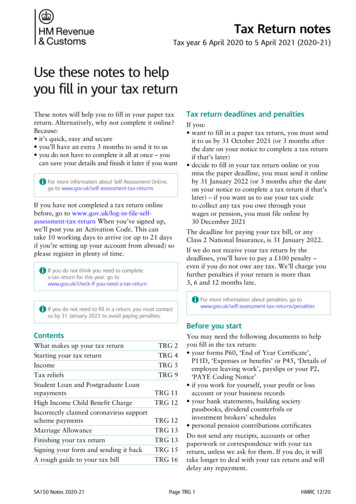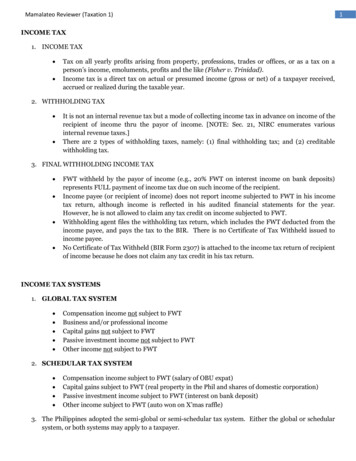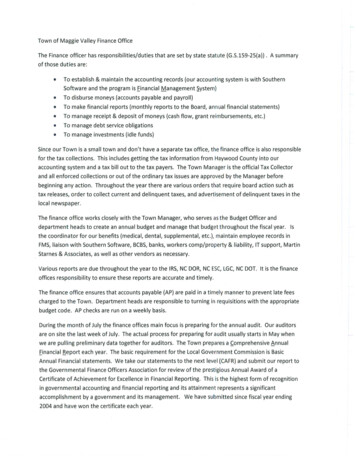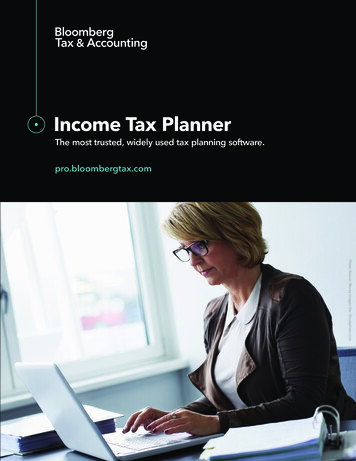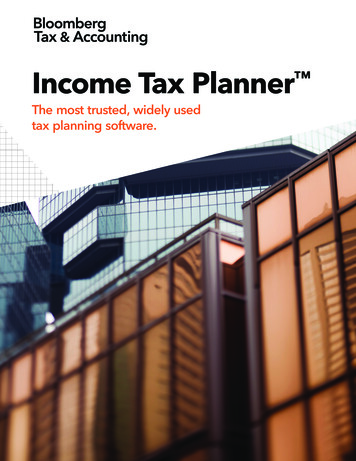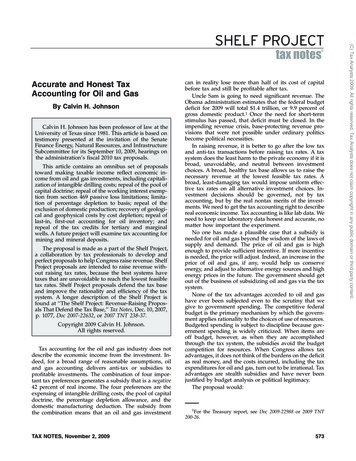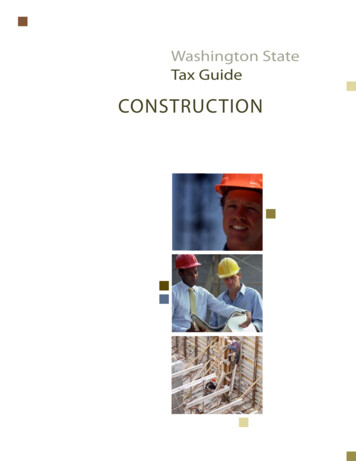
Transcription
Washington StateTax GuideCONSTRUCTION
ForwardThis guide has been created to help you betterunderstand the Washington State taxes that applyto your business. It is intended to teach contractorsabout how various construction activities are taxed inWashington State.We would like to acknowledge the followingorganizations for their assistance in the developmentof this guide and the construction industry taxworkshops: the Association of General Contractors;the Association of Washington Business; the BuildingIndustry Association of Washington; the IndependentBusiness Association; and the National Federation ofIndependent Business. Their help was instrumental indeveloping this guide and related workshops to best fitthe needs of construction industry members.The information contained in this guide is current atthe time of publication. Please remember, state taxlaws change on a regular basis and this guide will notreflect any changes made after printing.If you have questions or want additional informationreferenced in this guide, please call the Departmentof Revenue’s Telephone Information Center staffwith your specific tax questions at 1-800-647-7706 from 7:30 a.m. to 5 p.m. weekdays.Additional information on services and publications provided by the Department can be foundin the back of this guide.We hope you find this guide beneficial.
IntroductionTo properly report tax, business owners need to understand Washington’s business tax systemand general application of Business and Occupation (B&O) tax classifications, retail sales tax,and use tax. This guide will help those engaged in construction activities determine their statetax liability. It divides the types of construction into seven categories:1. Custom construction2. Speculative building3. Federal government contracting4. Public road construction5. Logging road construction6. Construction services performed in Indian country7. Contaminated site cleanup/Environmental Remedial ActionSECURE SAFEJoin the nearly 100,000 businessesthat file and pay their taxeselectronically. For information,call 1-877-345-3353 or go tohttp://dor.wa.gov and click onthe Online Services icon.FSTPLEASIMFREEThe categories are introduced in the following general overview section. Following theoverview is an in-depth discussion of how taxes apply to each of the construction categories.
Table of ContentsOverview of taxes that apply to construction . . . . . . . . . . . . . . . . . . . . . . . . 1-4Business and occupation tax . . . . . . . . . . . . . . . . . . . . . . . . . . . . . . . . . . . . . . 1Retail sales tax. . . . . . . . . . . . . . . . . . . . . . . . . . . . . . . . . . . . . . . . . . . . . . . . . 1Wholesale sales. . . . . . . . . . . . . . . . . . . . . . . . . . . . . . . . . . . . . . . . . . . . . . . . 1Purchases for resale. . . . . . . . . . . . . . . . . . . . . . . . . . . . . . . . . . . . . . . . . . . . . 2Use tax. . . . . . . . . . . . . . . . . . . . . . . . . . . . . . . . . . . . . . . . . . . . . . . . . . . . . . . 2Deferred sales tax. . . . . . . . . . . . . . . . . . . . . . . . . . . . . . . . . . . . . . . . . . . . . . . 2Gross contract price – taxable consideration. . . . . . . . . . . . . . . . . . . . . . . . . . 2Disputed claims/billings. . . . . . . . . . . . . . . . . . . . . . . . . . . . . . . . . . . . . . . . . 3Construction activities. . . . . . . . . . . . . . . . . . . . . . . . . . . . . . . . . . . . . . . . . . . 3Construction categories for tax purposes. . . . . . . . . . . . . . . . . . . . . . . . . . . . . 3Custom construction. . . . . . . . . . . . . . . . . . . . . . . . . . . . . . . . . . . . . . . . . . . . 5-10Prime contracting. . . . . . . . . . . . . . . . . . . . . . . . . . . . . . . . . . . . . . . . . . . . . . . 5Retail sales tax. . . . . . . . . . . . . . . . . . . . . . . . . . . . . . . . . . . . . . . . . . . . . . . . . 5Use tax. . . . . . . . . . . . . . . . . . . . . . . . . . . . . . . . . . . . . . . . . . . . . . . . . . . . . . . 8Bare rentals of equipment . . . . . . . . . . . . . . . . . . . . . . . . . . . . . . . . . . . . . . . . 8Providing tangible personal property along with an operator. . . . . . . . . . . . . 8Services rendered in respect to construction. . . . . . . . . . . . . . . . . . . . . . . . . . 8Construction activities and related parties. . . . . . . . . . . . . . . . . . . . . . . . . . . . 9Solid fuel burning devices. . . . . . . . . . . . . . . . . . . . . . . . . . . . . . . . . . . . . . . . 9Other income. . . . . . . . . . . . . . . . . . . . . . . . . . . . . . . . . . . . . . . . . . . . . . . . . . 9Deductions. . . . . . . . . . . . . . . . . . . . . . . . . . . . . . . . . . . . . . . . . . . . . . . . . . . . 9Other types of prime contracting. . . . . . . . . . . . . . . . . . . . . . . . . . . . . . . . . . 10Subcontracting. . . . . . . . . . . . . . . . . . . . . . . . . . . . . . . . . . . . . . . . . . . . . . . . 10Speculative building. . . . . . . . . . . . . . . . . . . . . . . . . . . . . . . . . . . . . . . . . . . 11-13Land ownership. . . . . . . . . . . . . . . . . . . . . . . . . . . . . . . . . . . . . . . . . . . . . . . 11Joint ventures. . . . . . . . . . . . . . . . . . . . . . . . . . . . . . . . . . . . . . . . . . . . . . . . . 12Road building on speculative projects. . . . . . . . . . . . . . . . . . . . . . . . . . . . . . 13Government contracting. . . . . . . . . . . . . . . . . . . . . . . . . . . . . . . . . . . . . . . . . . . 14Government contractor as the consumer. . . . . . . . . . . . . . . . . . . . . . . . . . . . 14Public road construction . . . . . . . . . . . . . . . . . . . . . . . . . . . . . . . . . . . . . . . 15-16Public road building activities. . . . . . . . . . . . . . . . . . . . . . . . . . . . . . . . . . . . 15Roads dedicated to the city or county . . . . . . . . . . . . . . . . . . . . . . . . . . . . . . 15Manufacturing/extracting materials by the contractor. . . . . . . . . . . . . . . . . . 16Material providers. . . . . . . . . . . . . . . . . . . . . . . . . . . . . . . . . . . . . . . . . . . . . 16Bifurcation of contract activity . . . . . . . . . . . . . . . . . . . . . . . . . . . . . . . . . . . 16
Logging road construction. . . . . . . . . . . . . . . . . . . . . . . . . . . . . . . . . . . . . . . . . 17Construction services performed in Indian country. . . . . . . . . . . . . . . . . 18-20Definitions. . . . . . . . . . . . . . . . . . . . . . . . . . . . . . . . . . . . . . . . . . . . . . . . . . . 18Prime contractor working directly for tribal members in Indian country. . . 18Subcontractor working for prime contractor in Indian country. . . . . . . . . . . 19Construction in Indian country for non-enrolled persons . . . . . . . . . . . . . . . 19Construction funded by the federal government. . . . . . . . . . . . . . . . . . . . . . 19Documenting tax-exempt transactions recordkeeping. . . . . . . . . . . . . . . . . . 20Current Indian Tribes. . . . . . . . . . . . . . . . . . . . . . . . . . . . . . . . . . . . . . . . . . . 20Contaminated site cleanup/Environmental Remedial Action. . . . . . . . . . 21-22Service activities . . . . . . . . . . . . . . . . . . . . . . . . . . . . . . . . . . . . . . . . . . . . . . 21Retail activities. . . . . . . . . . . . . . . . . . . . . . . . . . . . . . . . . . . . . . . . . . . . . . . . 21Hauling activities. . . . . . . . . . . . . . . . . . . . . . . . . . . . . . . . . . . . . . . . . . . . . . 21Combination contracts – services rendered in respect to construction . . . . . 21Cleaning bare land or water. . . . . . . . . . . . . . . . . . . . . . . . . . . . . . . . . . . . . . 22Environmental Remedial Action. . . . . . . . . . . . . . . . . . . . . . . . . . . . . . . . . . 22Audit process. . . . . . . . . . . . . . . . . . . . . . . . . . . . . . . . . . . . . . . . . . . . . . . . . 23-25Before the audit. . . . . . . . . . . . . . . . . . . . . . . . . . . . . . . . . . . . . . . . . . . . . . . 23What occurs during an audit? . . . . . . . . . . . . . . . . . . . . . . . . . . . . . . . . . . . . 23Computer Assisted Audit Program. . . . . . . . . . . . . . . . . . . . . . . . . . . . . . . . 23After the audit . . . . . . . . . . . . . . . . . . . . . . . . . . . . . . . . . . . . . . . . . . . . . . . . 24Formal appeal process. . . . . . . . . . . . . . . . . . . . . . . . . . . . . . . . . . . . . . . . . . 24Time period for appeal. . . . . . . . . . . . . . . . . . . . . . . . . . . . . . . . . . . . . . . . . . 24Categories of appeals. . . . . . . . . . . . . . . . . . . . . . . . . . . . . . . . . . . . . . . . . . . 24Summary . . . . . . . . . . . . . . . . . . . . . . . . . . . . . . . . . . . . . . . . . . . . . . . . . . . 26-27Out-of-state contractors. . . . . . . . . . . . . . . . . . . . . . . . . . . . . . . . . . . . . . . . . 26Requirement to obtain contractors’ UBI numbers. . . . . . . . . . . . . . . . . . . . . 26Laws and rules on construction activities . . . . . . . . . . . . . . . . . . . . . . . . . . . 26Services . . . . . . . . . . . . . . . . . . . . . . . . . . . . . . . . . . . . . . . . . . . . . . . . . . . 28-29Electronic filing. . . . . . . . . . . . . . . . . . . . . . . . . . . . . . . . . . . . . . . . . . . . . . . 28Telephone assistance. . . . . . . . . . . . . . . . . . . . . . . . . . . . . . . . . . . . . . . . . . . 28Written rulings. . . . . . . . . . . . . . . . . . . . . . . . . . . . . . . . . . . . . . . . . . . . . . . . 28Listserv. . . . . . . . . . . . . . . . . . . . . . . . . . . . . . . . . . . . . . . . . . . . . . . . . . . . . . 28Washington tax decisions – published determinations . . . . . . . . . . . . . . . . . 28Other services. . . . . . . . . . . . . . . . . . . . . . . . . . . . . . . . . . . . . . . . . . . . . . . . . 29Internet. . . . . . . . . . . . . . . . . . . . . . . . . . . . . . . . . . . . . . . . . . . . . . . . . . . . . . 29
Overview of taxes that apply to constructionWashington’s excise taxes apply to all businessactivities conducted in the state. Corporations,partnerships, sole proprietorships, joint ventures,nonprofit organizations, and limited liabilityorganizations, etc., conducting business in this state(whether or not the business has office locations inWashington), are all subject to these taxes.Example: A prime contractor with a 100,000construction contract hires a subcontractor toperform a portion of the construction for 20,000.The prime contractor is taxable on 100,000 andthe subcontractor is taxable on 20,000.Retail sales taxBusinesses selling goods at retail or performingretail services (such as custom prime construction)must also collect and remit retail sales tax ontheir total charges unless a specific exemptionapplies.Businesses subject to any of Washington’sexcise taxes must register with the Departmentof Revenue by completing a Master Application.Applications are available at local office locations,through the Department’s Telephone InformationCenter at 1-800-647-7706, and on our web site athttp://dor.wa.gov.This taxable amount includes charges for:»»»»»The following section provides an overview oftaxes that apply to construction, constructionactivities and a general description of the sevencategories of construction.Business and occupation (B&O) taxThis tax is levied on the gross receipts of businessoperations. There are no deductions for labor,materials, taxes or other costs of doing business.(An income tax, by comparison, is applied to thenet income of business operations.) The nature ofthe business activity determines appropriate B&Otax reporting.Sales tax rates vary around the state. Contractorsperforming retail services must collect sales taxbased on the tax rate of the jurisdiction in whichthey perform their services.Wholesale salesB&O tax classifications exist for extracting,manufacturing, wholesaling, retailing, governmentcontracting, public road construction, service andother activities, and others. Each classification hasits own tax rate. Businesses performing more thanone activity may be subject to tax under one ormore B&O tax classifications.Each business owes the B&O tax on its grossincome. 1 permits and other feeslaborprofitmaterialscharges for subcontractors.OverviewIf your business makes wholesale sales, youdo not collect retail sales tax on your charges.However, you must obtain resale certificates fromthe buyers to document why sales tax was notcollected.Wholesale sales are those made to businessesbuying a product or service for resale.Subcontractors on custom construction projects(a wholesaling activity) must receive and acceptin good faith a resale certificate from the primecontractor or another subcontractor.
Use as a consumer: Those engaged in constructionare considered consumers in regard to tools(purchased or rented) and supplies (items notfinally incorporated into the real estate) used inperforming the construction. However, dependingon the type of construction being performed, thebuilder may also be considered the consumer ofmaterials incorporated into the job.Refer to the section addressing the particularconstruction activity to find the types of itemsthat are used as a consumer. Contractors may notuse a resale certificate to purchase items “usedas a consumer” in performing constructionservices.Purchases for resaleRetail sales tax or use tax is not paid on purchasesfor resale. This applies to the purchase of itemsor services that will be resold without intervening“use as a consumer.”Contractors purchasing items for resale must givethe vendor a resale certificate to forgo paying salestax. If sales tax is paid, the contractor may claim a“tax paid at source” deduction (WAC 458-20-102).Use taxThis tax is due on items “used as a consumer”when retail sales tax has not been paid. If sales taxhas not been paid on purchases of tools, supplies,and materials used in the construction but notincorporated into the real estate improvements, usetax is due.Use tax is also due on items extracted or producedand used by the contractor in performing theconstruction. The use tax and sales tax rates are thesame. The applicable tax rate is determined by thelocation where the item is first used or where theconstruction service is performed.Deferred sales taxWhen goods are acquired without payment ofsales tax, but sales tax is due, the sales tax maybe deferred. This most commonly occurs whengoods are purchased for dual purposes; i.e., goodsboth resold and used in the business. A businessmay give its supplier a resale certificate for goodspurchased for dual purposes if the majority ofthe goods are purchased for resale. While manypeople assume that use tax is due if goods areused without the payment of sales tax, it’s actuallydeferred sales tax that is due.“Deferred” sales taxes means that the payment ofsales tax is postponed until it is determined thatthe goods will not be resold. Deferred sales taxis computed upon the selling price. This includesshipping and handling or freight charges. Therate of tax is also the same as if the seller hadcollected the tax, regardless of contractor’slocation.There is no specific line on the tax return fordeferred sales tax. Thus, when completing the taxreturn, report deferred sales tax on the use tax line(WAC 458-20-102).Gross contract price –taxable considerationThe gross contract price to provide a constructionservice is the amount subject to tax. It includesall charges related to a specified job under onecontract and all consideration paid withoutdeduction for costs, even if those costs would notbe defined as construction services if providedindependently of a construction contract.For example, billings to a customer are part of thegross contract price subject to tax including:building permitsengineering feesarchitectural feestoolstax expensescustomer’s payment of the contractor’sliabilities directly to third partiesWhen a contract calls for progress payments, taxis due on the gross amount billed. Sales tax isOverview »»»»»» 2
considered collected only when stated separatelyon contract documents and/or sales invoices.» radioactive waste cleanup» services in respect to the performance of any ofthe above jobsDisputed claims/billingsIn more specific terms, construction activities alsoinclude:Tax is due on amounts not paid due to a disputeuntil the unpaid claim is written off as a bad debt.If additional income results from a court-orderedsettlement, the income is considered part of thegross contract amount subject to tax. Some ofthe settlement funds may be considered by thecourt to be interest because of late payments. Thisinterest is not part of the gross contract amount,but it is subject to tax under the Service and OtherActivities B&O tax classification.»»»»»»performance of general contractingconstruction managementconstruction cleanup/debris removallandscapingpaintingplumbing» electrical wiring» heat/ventilation/air conditioning» roofing, flooring/carpeting» windows» masonry» concrete» drywall» lighting» windows» framing» carpentry» trim workPenalty clause in the contract: If a contractorsuffers a loss because of a penalty clause for failureto complete work by a specified time, the financialloss is not deductible from the gross contract pricein determining taxes due.If retainage is not paid because the contractor failedto perform, the lost retainage is not deductible fromthe gross amount subject to tax.Construction activitiesIn general terms, construction activities include,but are not limited to:Construction categories for tax purposesBusinesses perform construction activities as primecontractors, subcontractors, or speculative builders.Businesses may perform construction as a primecontractor on one job, a subcontractor on another,and as a speculative builder on yet another project.» installing, repairing, cleaning, improving,constructing and decorating real property» constructing and improving new or existingbuildings and structures» cleaning, fumigating, razing or movingstructures» cleaning and repairing furnaces and septictanks» clearing land and moving earth» drilling oil or water wells» building or improving streets, roads, etc.» hazardous waste site cleanup 3 Generally, a prime contractor is hired by thelandowner and a subcontractor is hired by a primecontractor. For state tax purposes, the differencebetween a prime contractor and a subcontractoris only significant on “custom” contracting jobs.Otherwise, a prime and subcontractor are treatedthe same for tax purposes.Overview
To properly report your taxes, you must determinewhich category of construction activities youperform. A general description of each of thecategories follows. More information on eachcategory of construction activity is detailed in therespective sections of this guide.1. Custom constructionInvolves residential and commercial constructionperformed for others, including road constructionfor the state of Washington.Prime contracting occurs when a contractoris hired by a landowner (or a person having therights of ownership, such as a lessee or easementholder) to complete an entire construction project.The custom prime contractor may perform all,or a portion of the construction, or hire othercontractors (subcontractors) to perform all, or aportion of the work. The income from customprime contracting (without deduction for anyamounts paid to subcontractors) is reported underthe Retailing B&O tax classification and is subjectto retail sales tax unless a specific exemptionapplies.Subcontracting occurs when a contractor is hiredby a custom prime contractor to provide a portionof the services necessary to complete the project.Income from custom subcontracting is reportedunder the Wholesaling B&O tax classification.project. In these cases, each contractor hired bythe landowner is taxable as a custom primecontractor.3. Federal Government contractingThis is when a prime or subcontractor engagesin constructing, installing, and improvingreal property of, or for, the United States, itsinstrumentalities, or a county or city housingauthority.4. Public road constructionOccurs when a prime or subcontractor builds,repairs, or improve streets, roads, etc., owned bya municipal corporation or political subdivision ofthe state of Washington or the federal government.(This does not apply to roads owned by the state ofWashington.)5. Logging road constructionThis happens when logging road construction isdirectly related to a logging operation.6. Construction services performed inIndian countryOccurs when construction is performed in Indiancountry for enrolled tribal members or nonenrolled persons.7. Contaminated site cleanup/Environmental Remedial Action2. Speculative buildingOccurs when a builder makes improvementson land he or she owns. Speculative buildersare not subject to B&O tax or retail sales tax onthe sale of the real estate. They are, however,subject to the real estate excise tax. On someprojects, the landowner will directly hire differentcontractors to perform portions of the totalThe special B&O tax classification forEnvironmental Remedial Action expired onJuly 1, 2003. The activities related to cleaningcontaminated sites will be taxed in accordance withthe specific activity performed or the predominateactivity if multiple activities are performed.Overview 4
Custom constructionThis section refers to all custom construction jobsexcept those specifically defined to be speculativebuilding, federal government contracting, publicroad construction, logging road construction,construction performed on Indian country, orcontaminated site cleanup/Environmental RemedialAction.Prime contractingElements of custom prime contracting:Generally, the prime contractor on a customconstruction job is hired by the owner of theland (or person having the rights of ownershipsuch as lessee) to complete an entire jobaccording to contract specifications. The customprime contractor may perform the constructionservices or hire others to perform some, or all, ofthe work.Excise tax reporting: Gross receipts from primecontracting on a custom construction job aretaxable under the Retailing B&O tax classificationand are subject to retail sales tax unless a specificexemption applies.Custom prime contractors as consumers:The prime contractor is a consumer of all itemsthat are not incorporated into the final project.In other words, a prime contractor is a consumerof tools, equipment, and supplies used inperforming the construction service. As aconsumer, the contractor must pay retail sales taxor use tax on such items. 5 Retail sales taxCollecting retail sales taxPrime contractors must collect retail sales tax fromthe landowner on the gross contract price (withoutdeduction of costs incurred). Billing invoicesmust separately state the sales tax. If the contractrequires retainage, sales tax must be computedbefore deducting retainage.The Department presumes that a selling pricequoted in any agreement between parties doesnot include the retail sales tax unless that taxis separately itemized. This is true even if thecontractor and buyer know and agree that theprice quoted includes state and local taxes. Thewords “tax included” is not sufficient. It does notsupersede the requirement to separately state thesales tax (RCW 82.08.050).Bid, contract, pay estimate, or draw requestA contract is written evidence of a sale and shouldlist sales tax as a separate amount. Even thoughwritten contract language may state that the sellingprice includes sales tax, it does not meet therequirement of separately stating sales tax from theselling price. Also, progress billings made againstthe total contract price of a job should separatelystate the sales tax. If a contract separately statesthe tax while individual billings omit the tax, thecontract will be satisfactory proof that a separateand identifiable sales tax amount was collectedfrom the customer. If individual billings separatethe tax, those billings are proof of tax collected.Custom construction
Example: XYZ,Inc. custom buildsresidential homeson Jane Smith’sland. XYZ, Inc.has determinedthat the contract tobuild is 162,000( 150,000 plus eightpercent tax). Thetable on the rightidentifies the variousways in which thecontractor maywrite the contractand explain the taxconsequences:Contract WordingIs Sales Tax Separately Stated?XYZ, Inc. has a signed contractwith Jane Smith which statesthe selling price is 162,000with “sales tax included.” XYZ,Inc. was paid 162,000 in total.There are no other documentssupporting amounts received.NO - The terms “sales tax included” do not quantify therate and amount of sales tax paid by Jane Smith.XYZ, Inc. signs a contract statingthe total price is 150,000 plus 12,000 sales tax. Progressinvoices do not separately statesales tax.YES - The contract quantifies the rate and amount ofsales tax paid by Jane Smith and this information isclearly stated to Jane Smith and XYZ, Inc. 162,000 x tax rate sales tax due 162,000 x .08 12,960 sales tax dueB&O tax is due on 162,000 150,000 x tax rate sales tax due 150,000 x .08 12,000 sales tax dueB&O tax is due on 150,000XYZ, Inc. signs a contractindicating tax was included ontotal price of 162,000. However,the invoices separately statesales tax.YES - The invoices quantify the rate and amount of salestax paid by Jane Smith and this information is clearlystated to Jane Smith and XYZ, Inc. 150,000 x tax rate sales tax due 150,000 x .08 12,000 sales tax dueB&O tax is due on 150,000RetainageYou must compute sales tax before amounts for retainage are deducted. Report the full selling price withoutdeduction for retainage under the Retailing B&O tax classification. This is subject to retail sales tax.Example: SchoolBuilders, Inc.,has a contractwith City HighSchool to renovatethe cafeteria for 100,000. SchoolBuilders, Inc., willinvoice based onprogress of the job.The sales tax rateis eight percent andretainage is fivepercent. SchoolBuilders firstprogress billingshould appear asfollows:INVOICESchool Builders, Inc.INVOICE NO: 1123 Anywhere St.Olympia, WA 98501360.000.0000Fax 360.000.0000DATE: January 6, 2005TO:Billing Period:City High SchoolAugust 2004ACTIVITYDESCRIPTIONAMOUNTCompleted to date 10,000.00Billed to date00.00Contract amount due to date 10,000.00Subtotal 10,000.00SALES TAX @ .08 800.00Less retainage (5% of 10,000) 500.00TOTAL DUE this billing 10,300.00Make all checks payable to: School Builders, Inc.THANK YOU FOR YOUR BUSINESS!Custom construction 6
Line item billingYou must collect retail sales tax on the full sellingprice, which includes costs that are itemized andcharged directly to the landowner. These costs arenot deductible from the total contract amount. Thefollowing invoice illustrates this:INVOICEXYZ, Inc.INVOICE NO: 2123 Anywhere St.Olympia, WA 98501000.000.0000Fax 000.000.0000DATE: August 2005TO:Billing Period:Mr. and Mrs. JonesACTIVITYJuly 2004DESCRIPTIONAMOUNTBuilding permit 200.00Architectural services500.00Dozer rental 1,000.00Paid dozer rental tax80.00Subtotal 1,780.00Profit & overhead178.00Subtotal 1,958.00SALES TAX @ .08156.64TOTAL DUE 2,114.64Make all checks payable to: XYZ, Inc.THANK YOU FOR YOUR BUSINESS!Paying retail sales taxThe contractor is the consumer of items purchasedfor use in the construction process and not usedas component parts of the finished structure.Therefore, retail sales tax must be paid to thevendors of such items.Resale certificatesThe purchase of materials by custom contractorsthat will become part of the completed projectare purchases for resale (wholesale). Thesepurchases are not subject to retail sales tax. Customcontractors also can purchase subcontractorservices for resale. A prime contractor must give avalid resale certificate to the materials supplier or 7 subcontractor to verify that material purchases andsubcontractor services are for resale.A resale certificate provides the seller withdocumentation that the purchases are intendedfor resale. The certificate must be completed inits entirety and signed by the buyer or otherperson authorized to make purchases on thebuyer’s behalf.A prime contractor may not use a resale certificateto purchase items that are consumed by thecontractor in performing construction. Examples ofsuch purchases are equipment, equipment rentals,tools, form lumber or visqueen not incorporatedinto the structure, duplex nails, and other suppliesused in performing the construction.Contractors who use resale certificates to purchaseitems or services they use as consumers will beassessed a misuse penalty of 50 percent of the taxdue on the improperly purchased item or service.This is in addition to all other taxes, penalties, andinterest due (RCW 82.32.291).On a resale certificate, a buyer must specifythe kinds of products or services purchased.A contractor who purchases some items toincorporate into the structure and other itemsfor use as a consumer, must clearly indicate theproducts or services purchased without payingsales tax (WAC 458-20-102).The buyer may list the particular products orservices to be purchased at wholesale, or providegeneral category description of these productsor services. The terms used to describe thesecategories must be descriptive enough to restrictthe application of the resale certificate to thoseproducts or services which the buyer is authorizedto purchase at wholesale. “Building materials” or“subcontract work” are examples of terms that maybe used by a prime contractor. A buyer purchasingall of the products or services from a particularseller at wholesale may “use all products and/orservices” to describe the items.Custom construction
Example: Residential Construction Co. purchasesbuilding materials to incorporate into a projectand tools for its own use from Joe’s Supply Co.Residential Construction Co. must give Joe’sSupply a resale certificate limiting the certificate’sapplication to building material purchases.Joe’s Supply must collect tax on the sale of to
and use tax. This guide will help those engaged in construction activities determine their state tax liability. It divides the types of construction into seven categories: 1. Custom construction 2. Speculative building 3. Federal government contracting 4. Public road construction 5. Logging road construction
